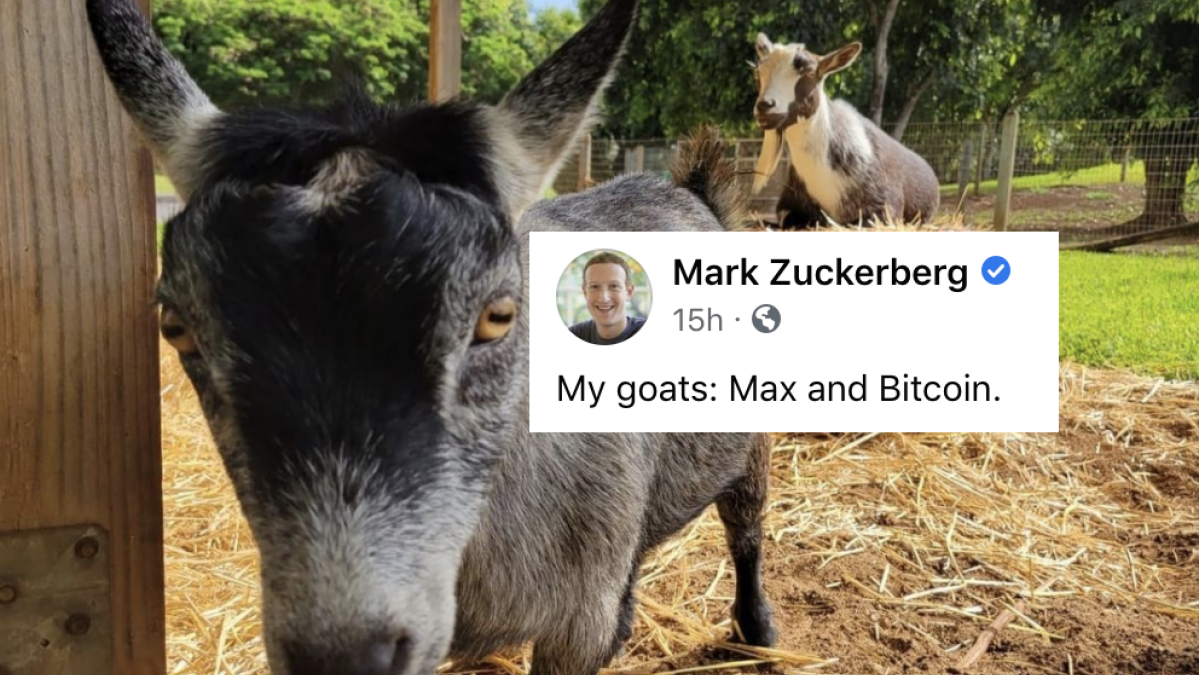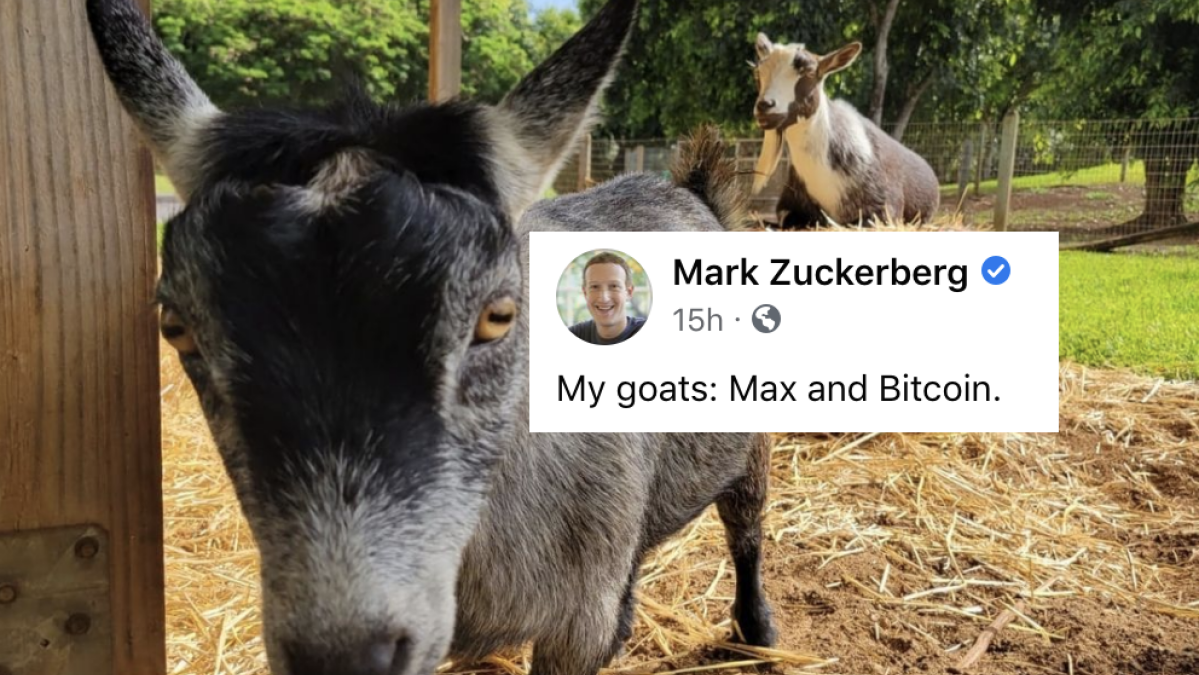Mark Zuckerberg’s decision to name one of his goats “Bitcoin” in 2021 sparked intense speculation about Meta’s relationship with the world’s leading cryptocurrency. While initially dismissed as a whimsical gesture, the act gains renewed significance in 2025 amid shareholder proposals urging Meta to allocate billions in cash reserves to Bitcoin as a hedge against inflation. This report synthesizes evidence from Meta’s corporate strategy, historical cryptocurrency ventures, and broader industry trends to evaluate whether Zuckerberg’s goat-naming signifies a deeper alignment with Bitcoin’s ethos or reflects a calculated corporate maneuver. Key findings suggest that while Meta has not yet adopted Bitcoin, mounting institutional pressure, Bitcoin’s performance as a treasury asset, and Zuckerberg’s personal symbolism create a compelling case for strategic integration.

Context of Zuckerberg’s Naming Decision
Public Reaction and Symbolic Interpretation
In May 2021, Zuckerberg shared a photo of his goats “Max” and “Bitcoin” on Facebook, igniting frenzied speculation across the crypto community136. Analysts like Morgan Creek Digital’s Anthony Pompliano questioned whether the names signaled Zuckerberg’s allegiance to Bitcoin maximalism—a belief in Bitcoin’s supremacy over other cryptocurrencies13. Others hypothesized that Meta might announce Bitcoin holdings at its shareholder meeting, mirroring Tesla’s $1.5 billion BTC purchase earlier that year36. However, Meta’s Q1 2021 earnings report revealed no crypto holdings, tempering expectations3.
The naming also carried darker undertones. Twitter CEO Jack Dorsey revealed in 2019 that Zuckerberg had killed one of his goats with a laser gun and served it for dinner138. This anecdote fueled interpretations that “Bitcoin” and “Max” might symbolize sacrificial lambs rather than endorsements. Robert Leshner, CEO of Compound Labs, quipped that Zuckerberg was “communicating that he will be eating Bitcoin Max(imalists) for dinner”38. Such duality—playful provocation versus veiled critique—reflects Zuckerberg’s history of leveraging ambiguity to gauge public sentiment.
Shareholder Proposals and Corporate Treasury Strategy
The 2025 Bitcoin Allocation Proposal
In January 2025, Meta shareholder Ethan Peck submitted a proposal urging the company to convert a portion of its $72 billion cash reserves into Bitcoin257. Peck, representing the National Center for Public Policy Research, argued that Bitcoin’s fixed supply and 1,265% five-year appreciation make it superior to traditional bonds for hedging inflation25. The proposal aligns with similar initiatives targeting Microsoft and Amazon, reflecting a broader institutional shift toward Bitcoin as a treasury asset7.
Precedent and Performance Metrics
Peck cited MicroStrategy’s success: the firm’s stock outperformed Meta’s by 2,191% over five years after adopting Bitcoin57. BlackRock, Meta’s largest institutional shareholder, has endorsed a 2% Bitcoin allocation in corporate portfolios5. With Meta’s cash reserves losing 28% of their value to inflation since 2020, the proposal frames Bitcoin as a necessary diversification tool25.
Historical Context of Meta’s Cryptocurrency Ventures
The Libra/Diem Experiment
Meta’s 2019 announcement of Libra (later rebranded Diem), a blockchain-based stablecoin, marked its first major foray into digital currencies4. Zuckerberg positioned Libra as a tool for financial inclusion, stating, “People should have the opportunity to send money with the same ease as sending a photo”4. However, regulatory pushback from central banks and governments stalled the project, with concerns over monetary sovereignty and financial stability14.
Lessons from Libra’s Demise
Libra’s failure underscored the challenges of introducing a centralized digital currency in a regulatory minefield. Unlike Bitcoin, which operates outside traditional financial systems, Libra’s ties to Meta invited scrutiny. This experience may inform Meta’s cautious approach to Bitcoin, as adopting a decentralized asset could mitigate regulatory risks while still advancing financial innovation.
Speculation vs. Strategic Indicators
Analyzing Zuckerberg’s Motivations
Zuckerberg’s goat-naming coincided with Bitcoin’s 2021 bull run, when institutional adoption gained momentum. While some dismissed it as a joke, the act aligns with his pattern of testing public reactions through oblique gestures. For instance, his 2011 “Year of Eating Meat” project—where he only consumed animals he killed—showcases a propensity for symbolic acts that blur personal and corporate branding68.
The Case for Strategic Signaling
- Platform Integration Potential: Meta owns three of the world’s largest communication platforms (Facebook, Instagram, WhatsApp). Integrating Bitcoin payments could revolutionize remittances and micropayments, particularly in developing economies47.
- Competitive Pressure: Tesla’s Bitcoin treasury and Apple’s rumored crypto wallet development pressure Meta to avoid lagging in financial tech25.
- Institutional Momentum: With BlackRock’s Bitcoin ETF amassing $10 billion in assets under management, ignoring Bitcoin risks alienating institutional investors57.
Implications of Bitcoin Adoption by Tech Giants
Financial and Technological Ramifications
If Meta allocates even 1% of its cash reserves ($720 million) to Bitcoin, it would rank among the largest corporate holders, alongside MicroStrategy ($8 billion) and Tesla ($1.5 billion)25. Such a move could trigger a domino effect, compelling peers like Google and Amazon to follow suit.
User Experience Innovations
- WhatsApp Payments: Enabling Bitcoin transactions via WhatsApp’s 2 billion users could bypass traditional banking infrastructure, reducing fees for cross-border transfers47.
- Creator Monetization: Instagram creators earning tips or revenue shares in Bitcoin would align with Gen Z’s preference for decentralized finance5.
- Metaverse Synergy: Bitcoin or Lightning Network integration in Meta’s VR ecosystems could facilitate seamless virtual economies7.
Conclusion: Decoding Zuckerberg’s Endgame
Zuckerberg’s goat-naming operates on multiple levels: a personal provocation, a corporate trial balloon, and a nod to Bitcoin’s cultural resonance. While Meta has not yet adopted Bitcoin, the 2025 shareholder proposal and Bitcoin’s maturation as a treasury asset make strategic integration increasingly plausible. The company’s Libra missteps demonstrate the risks of centralized digital currencies, making Bitcoin’s decentralized model a safer bet for regulatory compliance.
For Meta, the stakes transcend financial hedging. Bitcoin adoption would reposition the company as a pioneer in decentralized finance, countering its reputation for data exploitation and centralized control. As Zuckerberg himself stated in 2019, “Libra’s mission is to create a simple global financial infrastructure”4. Bitcoin—already achieving this mission without corporate intermediaries—may ultimately fulfill Zuckerberg’s original vision. The goats “Bitcoin” and “Max” thus serve not as a joke, but as a harbinger of Meta’s inevitable convergence with the cryptocurrency revolution.

No responses yet